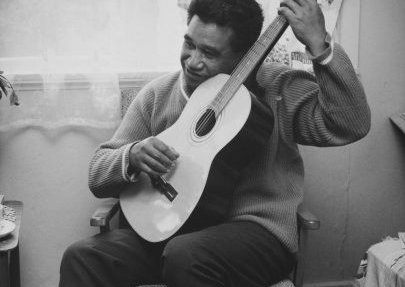
This biography was provided by the Hone Tuwhare Trust, for which we give special thanks.
Nga Puhi iwi; hapu Ngati Korokoro, Ngati Tautahi, Te Popoto and Te Uri-O-Hau.
Hone Tuwhare was the people’s poet. He was loved and cherished by New Zealanders from all walks of life. Touring tirelessly, Hone shared his talent and inspired audiences in every corner of the country – from primary and secondary schools to universities, factories to art galleries and prisons. As he travelled, Hone encouraged others to write, express themselves, create and celebrate life.
Born in 1922 in the small settlement of Kokewai, just south of Kaikohe, Hone spent much of his childhood in Auckland with his father Ben, following the passing of his mother Mihipaea when he was five.
Hone became a qualified boilermaker and through his trade, a member of the trade union movement and the Communist Party. He remained passionate about human rights for the rest of his life. He was particularly active in the 1970s when, among other things, he was an organiser of the first Maori Writers and Artists hui at Te Kaha and walked in the Māori Land March in 1975.
'The Sound of a Painting' - Filmed during the 'Hotere: Out the Black Window' Exhibition (1997)
Although he was too young to fight in Europe in World War Two, Hone served in Japan as part of the post-war occupation force. A year after his return in 1948, he married Jean Agnes McCormack. After living in Wellington where their eldest son Rewi was born, the family moved to Mangakino and later Te Mahoe in the central North Island. Hone worked on hydro-dams and twins Andrew and Robert were born.
A move to Beach Haven on Auckland’s North Shore in 1963 with the publication of his first book, No Ordinary Sun, in the following year, was life-changing for Hone. The collection was widely acclaimed and established him as a significant and unique presence on the New Zealand literary scene.
Over the following four decades he published 12 more collections of poems, some short stories and a play, and immersed himself in writing, performing and touring both in New Zealand and overseas. He was the recipient of many awards and fellowships and was twice winner of the Montana New Zealand poetry award. Hone was Te Mata Poet Laureate in 1999 and received two honorary doctorates in literature. He was named one of New Zealand’s ten greatest living artists in 2003.
'Drunk' - A Poem by Hone Tuwhare
By 1992, Hone was looking for a secure place to live and write for the rest of his life and purchased a modest crib overlooking the sea at Kaka Point on the coast of South Otago. He was a colourful and much-loved figure in the community and continued to write and tour, publishing his four last collections from there.
Hone passed away in Dunedin, on 16 January 2008.
Ngā Taonga holds a large collection of recordings of Tuwhare, and audiovisual works inspired by him. You can hear him reading from his first poetry collection in a radio feature from 1967; watch a video interpretation of his poem Drunk, and hear him reading Hotere at a City Gallery exhibition of the work of Ralph Hotere.
Check out our collection of Hone Tuwhare recordings.